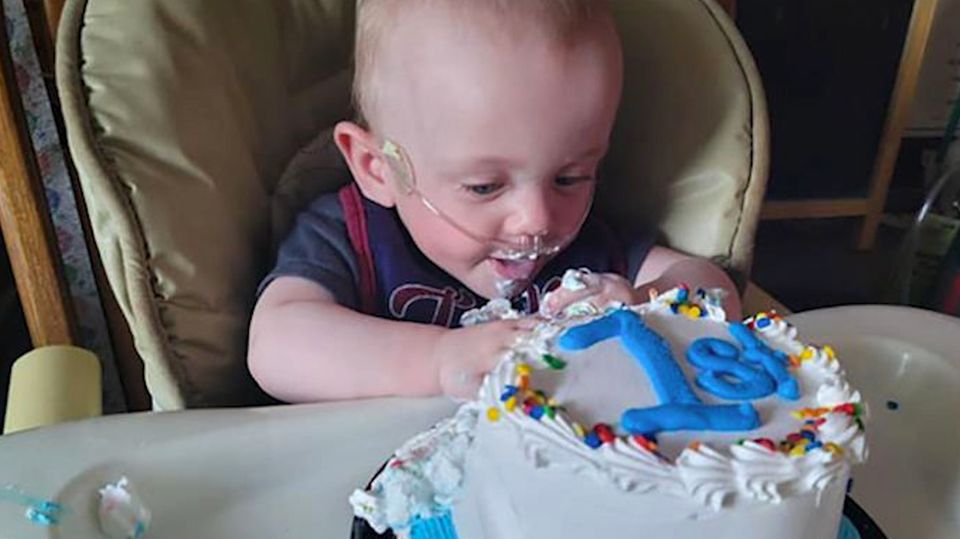In an Oldenburg hospital, contaminated baby food led to the death of a premature baby. Another baby is seriously ill. The public prosecutor’s office is trying to find out how the germ got into the milk powder.
A few days after its birth, a premature baby died of contaminated powdered milk in the Oldenburg Clinic. Another premature baby is therefore seriously ill, as the spokeswoman for the hospital, Sigrid Jürgensmann, said on Tuesday. The “Nordwest-Zeitung” had previously reported on it.
According to the spokeswoman, the baby, born in the 33rd week of pregnancy, died in intensive care on June 7th. Investigations showed that the food it was given on June 3rd – one day after its birth – was contaminated with a germ. The condition of the seriously ill baby has now stabilized. According to the spokeswoman, it is not yet foreseeable whether consequential damage will remain.
Other infants are being examined
Since so-called reserve samples have to be taken and temporarily stored during the preparation of food in the dairy kitchen, it was possible to clarify which other children received contaminated food. These infants were examined and the environmental germ Cronobacter was detected in three of them. According to the hospital spokeswoman, the babies show no signs of illness.
The Oldenburg public prosecutor’s office is investigating the negligent homicide of unknown persons. It is certain that the germ in the food led to the death of the premature baby, said spokesman Thorsten Stein. How the germ got into the milk is unclear. The entire supply and preparation chain is being examined. It must be clarified who was involved and how.
“We are all deeply affected”
The director of the University Clinic for Pediatric and Adolescent Medicine at the Oldenburg Clinic, Prof. Axel Heep, was shocked by the bacterial load and the fatal consequences. “It’s a terrible loss for the parents,” he said, referring to the death of the premature child. “We are all deeply affected and of course we are also sorry,” said Heep. “We’re talking to the parents about it and trying to support them.”
The hospital pointed out that it is still completely unclear how the environmental germ got into food. “There are several possibilities that we have also mentioned to the investigating authorities,” said spokeswoman Jürgensmann. “Even systemic errors in the food preparation process cannot yet be ruled out.” The germ could be in dust, on the ground, in sewage and drinking water and also on surfaces, wrote the spokeswoman with reference to a publication by the Federal Institute for Risk Assessment. “While it rarely or rarely leads to illnesses in adults, it can be dangerous for infants and children up to the age of 12 months,” says Jürgensmann.
The clinic’s milk kitchen is sterile
In the clinic, clinical areas and the dairy kitchen were examined for germ contamination, but the germ was not detected. Strict hygiene guidelines apply in the dairy kitchen to avoid infections caused by Salmonella and Cronobacter, which are particularly dangerous for babies with a birth weight of less than 2500 grams and immunocompromised infants. No germs were found in microbiological analyzes of the corresponding batches of newborn food either. “A further distribution of germs could not be determined,” said Jürgensmann.
In order to prepare the process with all processes, there were detailed discussions with the doctors and nurses of the ward, said the clinic spokeswoman. The hospital has informed several authorities, including the health department, the official food authority and the ministries of health and consumer protection.
For the time being, milk powder is not used
To protect against the spread of germs, the hospital has changed the processes involved in food production. The clinic is currently not using powdered milk. “If it is necessary to compose this special starting milk according to a doctor’s prescription, currently only industrially produced, ready-to-drink liquid milk is used which, according to the manufacturer, is sterile,” it said.
In 2011 there was an outbreak of germs in the intensive care unit for premature babies at the Bremen-Mitte Clinic, three premature babies died and other babies became ill.




